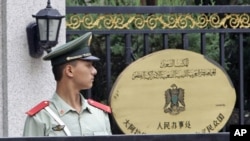While China has yet to officially recognize the Transitional National Council [TNC] as Libya’s legitimate government, it has made it clear it wants the United Nations to take the lead in rebuilding the country. Analysts say Beijing’s efforts to play a more active role in post-Gadhafi Libya highlight its increasingly flexible approach to foreign policy and China's desire to protect its national interests.
Unlike France, the United States and other Western countries, China abstained from voting when the United Nations took up the issue of using force to protect civilians in Libya earlier this year.
The stance was not surprising as China has traditionally opposed intervening in what it regards to be the internal affairs of other countries. Put simply - China does not like other countries meddling in its own affairs - be it human rights, Tibet or economic reforms - and it applies that same principle overseas.
What is changing though, analysts say, is China’s willingness to take bolder strides to get involved in international affairs.
Peter Pham, heads up the Africa center at the Atlantic Council - a Washington, D.C., based research group. He notes that while China abstained when the U.N. voted earlier this year - it didn’t oppose the vote either.
“Actually China has demonstrated at least in the situation in Libya remarkable flexibility that even six months ago or earlier one would not have anticipated,” said Pham.
China has been slowly reaching out to Libya’s TNC. In June, it signaled its willingness to engage both sides when Foreign Minister Yang Jiechi met the TNC leader Mahmoud Jibril. At the same time, China hosted Gadhafi’s foreign minister in Beijing.
On Wednesday, China’s Foreign Ministry gave its clearest show of support yet when it issued a statement saying it respects the choice of the Libyan people and hopes for a stable transition of power.
One day later, French President Nicolas Sarkozy made a stopover in Beijing and met with Chinese President Hu Jintao. Libya was one of several key topics the two discussed.
China’s Foreign Ministry also has urged Libya to protect its oil interests there. China is the world’s second biggest consumer of oil. Last year, three percent of its oil imports came from Libya.
Pham said China’s foreign policy is increasingly more a reflection of its national interests - not just in terms of access to raw materials, but contracts for state-owned enterprises as well.
“It’s a flexibility we’ve seen certainly demonstrated in Libya, but also previously in Sudan, where for years the Chinese government supported the government in Khartoum, but as the secession of southern Sudan became more apparent, China pivoted very quickly and has established friendly relations with the government in Juba,” said Pham.
Jonathan Pollack, a senior fellow at the Brookings Institution - a Washington based research group said that with such an approach it is hard to tell if China alienated itself from the opposition in Libya.
“The Chinese are trying to find a way to thread the needle between insisting that they will not intervene in any other countries internal affairs, but then position themselves seemingly almost somewhat in a passive way to walk both sides of the street, and then when the situation resolves itself presumably recognize whatever government authority emerges,” said Pollack.
According to state-media, China is involved in 50 projects in Libya, worth more than $20 billion. The projects range from telecommunications, railway, oil to roads, the construction of buildings and infrastructure projects.
When the uprising began China had to evacuate more than 35,000 workers from Libya. Analysts say that as of June, state-owned enterprises alone incurred as much as $625 million in losses because of the conflict.
Chinese officials have already voiced their concern and hope that Beijing will continue to have opportunities in Libya.
Here’s what Wen Zhongliang, deputy head of the Chinese Ministry of Commerce’s trade department had to say earlier this week at a news conference.
Wen said it is well known that the situation in Libya has affected China's investment activities there. He said China hopes that after there is a return to stability, Libya will continue to protect the interests and rights of Chinese investors.
Libyan opposition leaders have said they will honor all legal contracts that were made by the Gadhafi regime, but some in the opposition have suggested China and Russia could lose out because of their lack of support for the rebels.
The issue of contracts is one of many expected to be on the table next week when members of the TNC attend an international conference in Paris on Libya’s future. China has been invited to attend the conference, as well.




